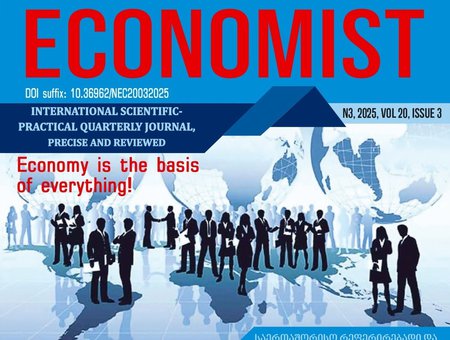Georgia’s Strategic Priorities in Regional Integration Amid Global Challenge

Shota Veshapidze
Doctor of Economic Sciences, Associate Professor, Ivane Javakhishvili Tbilisi State University

Lela Jamagidze
Doctor of Economics, Associate Professor, Ivane Javakhishvili Tbilisi State University

Levan Kereselidze
Doctor of Economics, Associate Professor, Ivane Javakhishvili Tbilisi State University

Ramaz Futkaradze
Doctor of Economics, Associate Professor, Ivane Javakhishvili Tbilisi State University
Abstract
Relevance of the topic: The contemporary global context represents a polycrisis reality encompassing armed conflicts, climate change, energy security concerns, economic instability, and growing technological inequality. These realities place particular emphasis on the importance of regional integration, especially for small and medium-sized countries such as Georgia. Located at a strategically significant geographic crossroads between East and West, Georgia views regional integration as a strategic path to development and a means of strengthening its position within the global system. The current geopolitical and economic environment, including the impact of the COVID-19 pandemic and the Russia-Ukraine war, presents both new risks and a necessity for deepened international cooperation for Georgia.
Goal of the study: The aim of the study is to explore modern trends in regional integration and to identify Georgia’s strategic priorities in this process. Based on the analysis, the goal is to determine Georgia’s targeted directions for economic, political, and social development, which will support the country in achieving sustainable development under global challenges.
Subject of the research: The subject of the research is Georgia and its participation in regional integration processes. It is studied through the lenses of the modern forms of regional integration, theoretical paradigms, and their economic and political impact on Georgia's development.
Theoretical and practical significance: Theoretically, the paper contributes to the analysis of integration theories under modern conditions and offers a discussion of a practical implementation model based on the example of Georgia. Practically, the results of the research can play a significant role in the planning of national economic policies, foreign strategies, investment attraction mechanisms, and the education system. Moreover, the paper is useful for academic programs related to global economics, international relations, and business administration.
Findings and discussion: The research revealed that regional integration presents both challenges and opportunities for Georgia. The country’s active engagement in platforms such as the EU Association Agreement and DCFTA, TRACECA, the Middle Corridor, and Black Sea regional cooperation provides opportunities for economic diversification, trade expansion, energy independence, and the strengthening of its transit function. The share of EU countries in Georgia’s export structure and the volume of foreign direct investment have increased over the last decade, indicating a positive economic impact from integration. However, challenges remain, including internal institutional weaknesses, occupied territories, and excessive dependence on certain markets. Achievements in the energy and transportation sectors highlight Georgia’s potential to become a key hub in regional infrastructure networks.
Conclusion: Regional integration represents a vital path for Georgia’s long-term development and active participation in the global system. However, success in this process requires a consistent economic strategy, strengthened institutional reforms, and public consensus on Western integration. Georgia’s success will largely depend on how effectively it manages the allocation of resources, handles geopolitical risks, and develops an inclusive economic model.
References
- Adarov, A., & Havlik, P. (2016). Benefits and costs of DCFTA: Evaluation of the impact on Georgia, Moldova and Ukraine. The Vienna Institute for International Economic Studies (wiiw). https://wiiw.ac.at
- Baier, S. L., & Bergstrand, J. H. (2007). Do free trade agreements actually increase members’ international trade? Journal of International Economics, 71(1), 72–95. https://doi.org/10.1016/j.jinteco.2006.02.005
- Badinger, H., & Breuss, F. (2011). The quantitative effects of European post-war economic integration. Review of World Economics, 147(2), 207–247. https://doi.org/10.1007/s10290-011-0084-3
- Balassa, B. (1961). The theory of economic integration. Homewood, IL: Richard D. Irwin. https://api.pageplace.de/preview/DT0400.9781136646317_A23860489/preview-9781136646317_A23860489.pdf
- Baldwin, R. (2016). The great convergence: Information technology and the new globalization. Harvard University Press.
- Baldwin, R., & Wyplosz, C. (2020). The economics of European integration (6th ed.). London: McGraw-Hill Education.
- Basilia, T., Silagadze, A., & Chikvaidze, T. (2001). Post-socialist transformation: Georgian economy at the turn of the 21st century (V. Papava, Ed.). Tbilisi. (In Georgian)
- Beyer, R., Li, C. Y., & Weber, S. (2025). Economic benefits from deep integration: 20 years after the 2004 EU enlargement (IMF Working Paper). International Monetary Fund.
- Colacito, R., & Croce, M. M. (2010). The short and long run benefits of financial integration. American Economic Review, 100(2), 527–531. https://doi.org/10.1257/aer.100.2.527
- Collyer, M., Hinger, S., & Schweitzer, R. (2020). Politics of (Dis)Integration – An introduction. In S. Hinger & R. Schweitzer (Eds.), Politics of (Dis)Integration (pp. 1–18). Springer. https://doi.org/10.1007/978-3-030-25089-8_1
- De Grauwe, P. (2018). Economics of monetary union (12th ed.). Oxford: Oxford University Press.
- El-Agraa, A. M. (2011). The European Union: Economics and policies (9th ed.). Cambridge: Cambridge University Press.
- Emerson, M., & Kovziridze, T. (2019). EU–Georgia DCFTA: Results after 5 years and perspectives. 3DCFTAs.eu. https://3dcftas.eu/op-eds/eu-georgia-dcfta-results-after-5-years-and-perspectives
- European Commission. (2012). EU-Georgia Deep and Comprehensive Free Trade Area (DCFTA). https://policy.trade.ec.europa.eu/eu-trade-relationships-country-and-region/countries-and-regions/georgia_en
- Felipe, J., Kumar, U., & Abdon, A. (2014). How rich countries became rich and why poor countries remain poor: It’s the economic structure … duh! Japan and the World Economy, 29, 46–58.
- Freund, C., & Ornelas, E. (2010). Regional trade agreements. Annual Review of Economics, 2, 139–167. https://doi.org/10.1146/annurev.economics.102308.124451
- Fuenfzig, M. (2016). A quantitative assessment of the proposed China–Georgia free trade agreement.
- Gehler, M. (2022). Integration and disintegration: Different types of Europeanization... In Reconsidering Europeanization. De Gruyter.
- Government of Georgia. (2023, August 15). On the approval of the National Transport and Logistics Strategy of Georgia... http://matsne.gov.ge/document/view/5895599
20. Grossman, G. M., & Helpman, E. (1991). Innovation and growth in the global economy. MIT Press.
21. Gurova, I. (2014). World economy. Tbilisi. (In Georgian)
22. Haas, E. B. (1970). The Study of Regional Integration... International Organization, 24(4), 607–646. http://www.jstor.org/stable/2706149
23. Jamagidze, L. (2019). Import of institutions in the field of Georgia-EU trade relations. Economy and Business, (3), 199–216. (in Georgian)
24. Jamagidze, L. (2020). Trade policy directions in response to new challenges... Globalization and Business, (9), 70–76. (in Georgian)
25. Karchava, L., Nanuashvili, I., Zoidze, G., & Veshapidze, S. (2025). Georgia’s Strategic Role in Eurasian Transport... The New Economist, 20(2), 40-53.
26. Karchava, L., Veshapidze, S., & Tsikelashvili, S. (2025). Georgia's Perspective in the Context of Developing Economic Relations... The New Economist, 20(1), 8-23. (In Georgian)
27. Lomia, E., 2021. China’s Belt And Road Initiative And Georgia: A Short Overview. Journal of Liberty and International Affairs, 7(3), pp.373-385
28. Lomia, E., 2020. The Evaluation of Russia's foreign policy towards Georgia following the ‘Rose Revolution’. Journal of Liberty and International affairs, 6(1), pp.112-128
29. Lomia, E. and Karchava, L., 2021. Georgian ethnopolitical conflict as a subject of confrontation between the USA and Russia. Journal of Liberty and International Affairs, 7(2), pp.90-102
30. Machlup, F. (1977). A history of thought on economic integration. New York: Columbia University Press.
31. Masclanis, F. (2025). Georgia’s integration into the European Union: A synergy of mutual interests. Globalization and Business, 19. https://doi.org/10.35945/gb.2025.19.012
32. Mekvabishvili, E. (2021). Challenges of economic crisis in the world and in Georgia. Tbilisi. (in Georgian)
33. Mgebrishvili, M. (2020). Economic analysis of Georgia’s free trade agreements with EU and China. PMC Research Center. (in Georgian)
34. Papava, V. (2001). Georgia’s international economic function. Social Economy, (5). (in Georgian)
35. Papava, V. (2020). Becoming European: Challenges for Georgia in the twenty-first century. iUniverse.
36. Papava, V. (2020, August 6). Georgia’s European way during the period of pandemic deglobalization. Rondeli Blog. https://gfsis.org.ge/blog/view/1091
37. Papava, V. (2021, October 18). On pseudo de-globalization, Silk Road of global value chains... Eurasia Review. https://www.eurasiareview.com/18102021-on-pseudo-de-globalization-silk-road-of-global-value-chains-and-role-of-georgia/
38. Papava, V. (2025). The Middle and Zangezur Corridors: Alternatives... International Core Academy of Sciences and Humanities. https://www.coreacad.org/upload/file/20250914/6389340983450501816257595.pdf
39. Papava, V., & Tapladze, T. (2012). On economic relations between Georgia and Russia. Ekonomisti, (1).
40. Pelkmans, J. (2016). European integration: Methods and economic analysis (4th ed.). Harlow, UK: Pearson Education.
41. Putkaradze, R. (2017). The European Free Trade Association and Georgia. (In Georgian)
42. Schmitter, P. C., & Lefkofridi, Z. (2015, July 8–10). Neo-functionalism as a theory of disintegration. 22nd CES Conference.
43. Shengelia, T. (2022). Economic development of the South Caucasus countries during the COVID-19 pandemic. Collected Papers, 363–370.
44. Silagadze, A., & Zubiashvili, T. (2015). Parameters of the EU and post-Soviet Georgia’s economy. International Journal of Business and Management Studies.
45. Silagadze, A., Atanelishvili, T., & Silagadze, N. (2022). Covid depression and search for a new paradigm. Bulletin of the Georgian National Academy of Sciences, 16(1), 121–125.
46. Silagadze, A., Mekvabishvili, E., Gaganidze, G., Atanelishvili, T., & Chikviladze, M. (2024). Adaptation of economic policies... Scientific Bulletin of Mukachevo State University, 11(4), 106–119. https://doi.org/10.52566/msu-econ4.2024.106
47. Silagadze, A., Mekvabishvili, E., Gaganidze, G., Atanelishvili, T., & Chikviladze, M. (2024). Long-term consequences of socio-economic and tax policies... Scientific Herald of Uzhhorod University, (56), 2422–2433. https://doi.org/10.54919/physics/56.2024.242wm2
48. Tinbergen, J. (1954). International economic integration. Amsterdam: Elsevier. https://repub.eur.nl/pub/15343/SECOND%20PART.PDF
49. Venables, A. J. (2003). Winners and losers from regional integration agreements. The Economic Journal, 113(490), 747–761. https://doi.org/10.1111/1468-0297.t01-1-0015
50. Veshapidze, S., Bakhtadze, L., Putkaradze, R., Kharitonashvili, J., Danelia, I., Lominashvili, M., & Chantladze, N. (2024). Contemporary international economic relations of Georgia: Monograph. Tbilisi: Smarty. (In Georgian)
51. Veshapidze, S., Jamagidze, L., Kereselidze, L., Putkaradze, R., Daudishvili, T., Kitashvili, S., & Megreladze, G. (2025). Georgia's European integration prospects: Monograph. Tbilisi: Smarty. (In Georgian)
52. Veshapidze, S., Kereselidze, L., & Tsirdava, N. (2024). Decarbonization of energy and challenges of sustainable development of Georgia. (In Georgian)
53. Veshapidze, S., & Karchava, L. (2022). Contradictions of Globalization under the COVID-19 Pandemic. Bull. Georg. Natl. Acad. Sci, 16(4), 152–157.
54. Veshapidze, S., & Putkaradze, R. (2023). Georgia’s international economic relations... Ekonomisti, (1), 58–69.
55. Viner, J. (1950). The customs union issue. Carnegie Endowment for International Peace.
56. World Bank. (2023). The Middle Trade and Transport Corridor: Policies and Investments to Triple Freight Volumes and Halve Travel Time by 2030
57. WIPO. (2025). Global Innovation Index 2025.
The new Economist, No3, 2025, Vol. 20, Issue 3.

11/10/2025
Copyright (c) 2025 Shota Veshapidze, Lela Jamagidze, Levan Kereselidze, Ramaz Futkaradze

This work is licensed under a Creative Commons Attribution-NonCommercial-NoDerivatives 4.0 International License.
